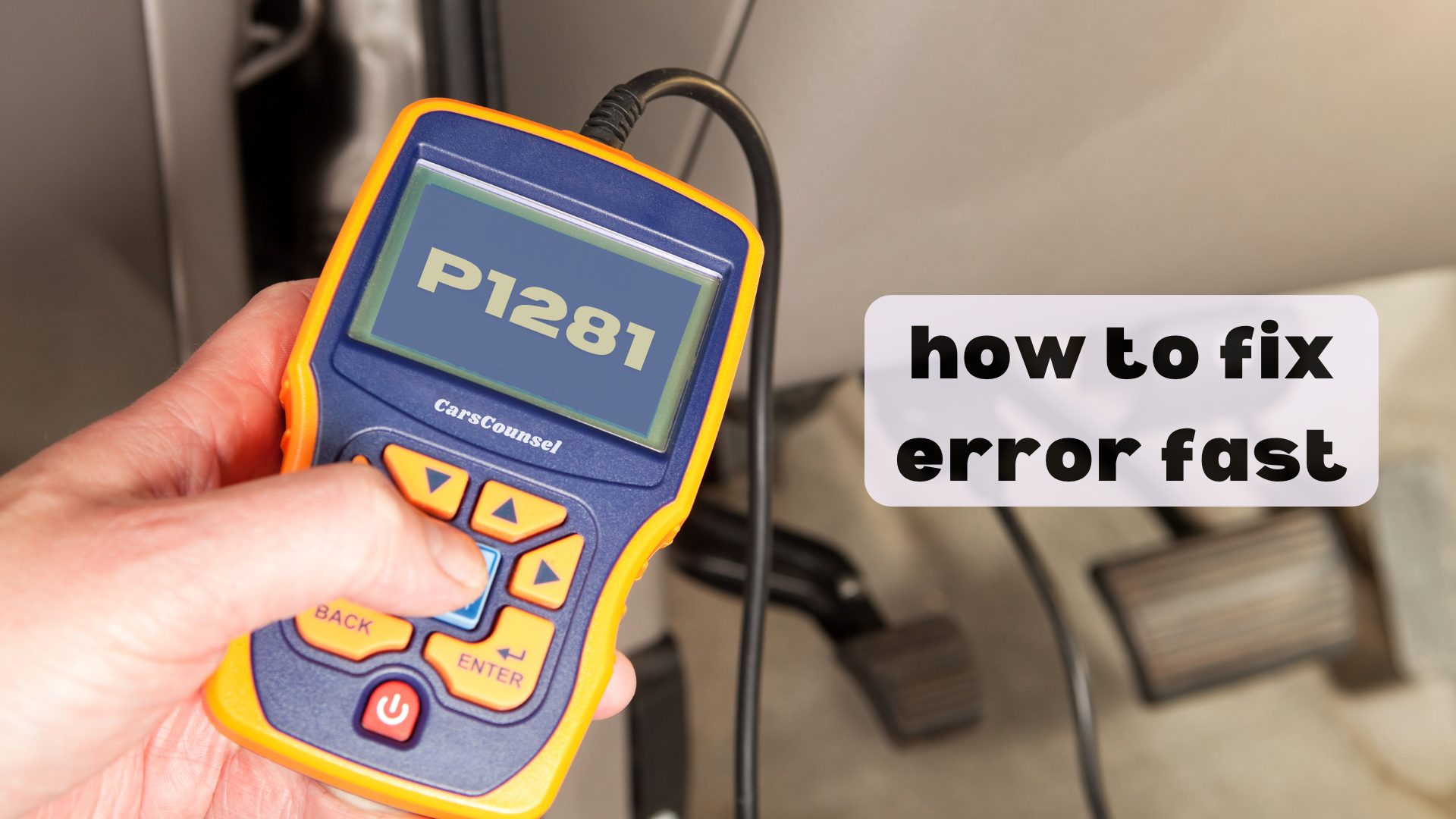Did you know that one in five cars on the road today has a faulty engine coolant temperature sensor, a common culprit behind the P1281 code?
This fault code indicates that your engine is taking too long to warm up, which can lead to poor fuel economy, reduced performance, and increased emissions.
You might be wondering what’s causing this issue and how it’s affecting your vehicle. The good news is that identifying the root cause is key to restoring your engine’s performance and efficiency – and that’s exactly what we’re about to investigate.

Quick Navigation
Key Takeaways
- Code P1281 indicates the engine remains cold for an extended period, compromising performance and efficiency.
- A cold engine can cause potential damage to engine components over time, leading to costly repairs.
- Common causes of the P1281 error include coolant leaks, malfunctioning thermostats, and faulty engine coolant temperature sensors.
- Performing a diagnostic scan and visual inspection of the engine’s cooling system is essential to identify and address the underlying cause.
- Ignoring the P1281 code can lead to more severe and costly consequences, making timely repair vital to preventing engine damage.
Understanding Code P1281
Most modern vehicles are equipped with advanced onboard diagnostic systems that monitor various engine parameters to certify peak performance and efficiency.
These systems can detect issues that affect your vehicle’s overall engine performance. If your engine remains cold for an extended period, it can lead to problems that impact your vehicle’s performance and efficiency.
A cold engine may not reach its ideal operating temperature, resulting in poor fuel economy, reduced engine performance, and increased emissions. This can also potentially damage engine components over time.
Understanding code P1281 is vital to identifying and addressing issues that affect your engine’s performance. It will help you take corrective action to get your vehicle running smoothly and efficiently.
Causes of the P1281 Error
When your engine remains cold for an extended period, it can trigger a diagnostic trouble code P1281, indicating that your vehicle’s performance and efficiency are being compromised.
This code can be caused by several factors, including:
- Coolant leaks: Leaks in the cooling system can prevent the engine from reaching its ideal operating temperature, leading to poor performance and efficiency.
- Malfunctioning thermostat: A faulty thermostat can prevent the engine from warming up properly, resulting in decreased performance and efficiency.
- Faulty engine coolant temperature sensor: A faulty sensor can provide incorrect temperature readings, leading to incorrect engine temperature regulation.
- Engine overheating: Engine overheating can also trigger the P1281 code, as it can cause the engine to remain cold for an extended period.
It’s essential to identify and address the underlying cause to restore your vehicle’s performance and efficiency.
Recognizing the Symptoms
One common indication that your vehicle’s engine is remaining cold for an extended period is a noticeable decrease in its overall performance.
You may experience poor fuel economy, which can be frustrating and costly. Additionally, you might notice reduced engine performance, making it difficult to accelerate or maintain speed.
Increased emissions are also a possibility, which can negatively impact the environment and your vehicle’s overall efficiency.
Moreover, you may notice that your vehicle’s interior takes longer to heat up, making for an uncomfortable driving experience.
Besides, these performance issues are all symptoms of a cold engine, and it’s essential to address them promptly to avoid further damage.
Diagnosing the Issue
Two key steps are essential in diagnosing the issue behind code P1281:
Performing a diagnostic scan and conducting a visual inspection of the engine’s cooling system are crucial. You need to identify the root cause of the problem to address it effectively.
- Scan for trouble codes: Use a code reader or scan tool to retrieve any trouble codes stored in the engine control module (ECM). This will help you identify if there are any other related issues.
- Inspect the cooling system: Look for signs of leaks, blockages, or damage to the radiator, hoses, and water pump.
- Check the thermostat: Verify it’s functioning properly and not stuck in the closed position, preventing the engine from reaching its ideal operating temperature.
- Monitor engine temperatures: Use a thermometer to check the engine’s temperature and confirm it’s within the recommended range.
Fixing the Problem
Now that you’ve identified the root cause of the P1281 code, it’s time to take corrective action.
You’ll need to address the issue to prevent prolonged periods of a cold engine, which can negatively impact engine performance.
Start by performing a diagnostic scan to confirm the code and identify any related issues.
Next, inspect the thermostat and engine coolant temperature sensor, replacing them if necessary.
Check the cooling system for leaks or blockages and repair as needed.
Finally, test the fuel mixture and adjust it if incorrect to improve engine performance and efficiency.
Repair Cost Estimates
The cost of repairing the issue indicated by code P1281 can vary widely, depending on the specific cause of the problem and the vehicle make and model.
You’ll need to weigh the cost of parts and labor, as well as any additional repairs that may be necessary.
- Parts: $50 to $200 for a thermostat or engine coolant temperature sensor
- Labor costs: $80 to $150 per hour, depending on the auto repair shop
- Total cost: $150 to $500 or more, depending on the complexity of the repair
- Insurance coverage: Check your policy to see if repairs are covered under warranty or insurance; this could help reduce your out-of-pocket expenses.
It’s a good idea to consult with a professional mechanic to get a more accurate estimate based on your vehicle’s specific needs.
Importance of Timely Repair
Failing to address the P1281 code in a timely manner can lead to more severe and costly consequences down the road.
You’ll be putting your cold engine at risk of further damage, which can result in a longer and more expensive repair process. A timely fix is vital to preventing these issues from escalating.
By addressing the problem promptly, you’ll avoid compromising your engine’s performance and efficiency. A cold engine can lead to poor fuel economy, reduced engine performance, and increased emissions, which can be costly to repair in the long run.
Don’t wait – get a timely fix to guarantee your engine runs smoothly and efficiently.
Prevention and Maintenance Tips
By addressing the P1281 code promptly, you’ve taken a significant step towards guaranteeing your engine runs smoothly and efficiently.
To prevent future occurrences and maintain your vehicle’s performance, consider the following preventative measures:
- Regular Maintenance: Schedule regular check-ups with a mechanic to identify potential issues before they escalate.
- Thermostat Inspection: Inspect your thermostat regularly to confirm it’s functioning correctly and replace it if necessary.
- Coolant System Check: Check your coolant system for leaks or blockages and address any issues promptly.
- Fuel Mixture Adjustment: Certify your fuel mixture is correct to optimize engine performance and efficiency.
More OBD-II Codes
Conclusion
You’ve finally made it to the end of this article, and by now, you’re probably thinking, “Great, another thing to worry about with my car.” But let’s be real, ignoring the P1281 code is like playing a game of engine roulette – eventually, you’ll lose. So, don’t be that person who waits until their engine is on its last legs. Take control, diagnose, and fix the issue. Your wallet (and the environment) will thank you.

